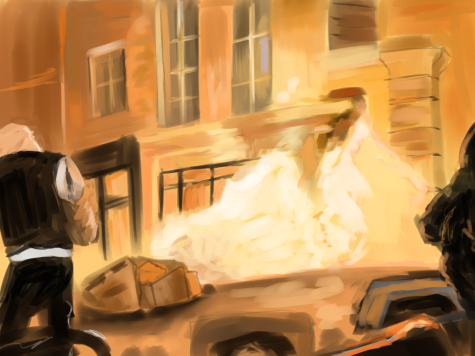Reflections on the New Cold War: America and China’s Lethal Waltz
April 27, 2023
Before COVID-19, I was supposed to visit my relatives in China and their dog Nina. My brother and I had a plan to drink bubble tea all day long and gorge ourselves on Chinese food.
Then, like thunder on a midnight lake, the virus sprang into existence—and along with it, rising tensions between the United States (US) and China. Because COVID-19 originated in Wuhan, former president Donald Trump blamed China, referring to the virus as the “kung flu” or alternatively, the “China virus” [1]. President Xi Jinping fired back with his own ammunition, claiming that the insults were an attempt to cover up Trump’s failure to contain the virus. The situation morphed into a vicious downward spiral with no end in sight.
Trapped in an “ideological spiral,” America and China continually butt heads and creep ever closer towards a new Cold War—this generation’s US and Soviet Union [2]. Relations weren’t great to begin with. With the virus acting as the last straw, the lines on the battlefield were drawn. Diplomatic relations tumbled, with neither side attempting to remedy the mess. The US and China squabble over everything from technology to territory to trade to space – characteristics extremely reminiscent of the original Cold War.
What started as minor fissures and cracks in the relationship swelled into gaping chasms that any president will have a tough time fixing. Fast-forward to Joe Biden’s presidency; the year 2022 saw simmering tensions near the point of explosion between the two states. Twisted language, backhanded compliments, and implied threats were exchanged by both countries, particularly over the globally disputed subject of Taiwan. The US and China are edging closer and closer to an outright, explosive conflict. From fighter jets to military tracking, China has become bolder in testing the US and its allies [3]. Likewise, the US has made no secret of its subtle curiosity about seeing how the situation escalates.
A more hidden—yet equally as detrimental—side effect of the souring relationship attacks those Americans of Chinese ethnicity. The problem children of both America and China face is especially pressing in an era when the two countries clash on everything imaginable. We don’t know how to preserve who we used to be without betraying who we are now. China isn’t our country, but our roots are there, right? How do we decide after seeing the effects of simply daring to claim American nationality—seeing people shunned and attacked by those who believe they are more American than us? These are the moral questions immigrants and their children must grapple with every day as the war of wills rages on between the US and China. What do we pick? Home, or where our families came from?
As of 2023, meaningful steps of progress towards better relations still remain few and far between. Although the hostility has died down by a fraction, the trigger topic of Taiwan remains a famous area of diplomatic battle, one whose fate the world awaits with bated breath. But there are greater evils than each other, and mutual cooperation would benefit both countries. COVID-19 should have taught us that much at least.
[1] https://www.frontiersin.org/articles/10.3389/fcomm.2021.624643/full
[2] https://www.nytimes.com/2020/07/14/world/asia/cold-war-china-us.html
[3] https://www.nytimes.com/2022/06/15/opinion/international-world/us-military-china-asia.htm



